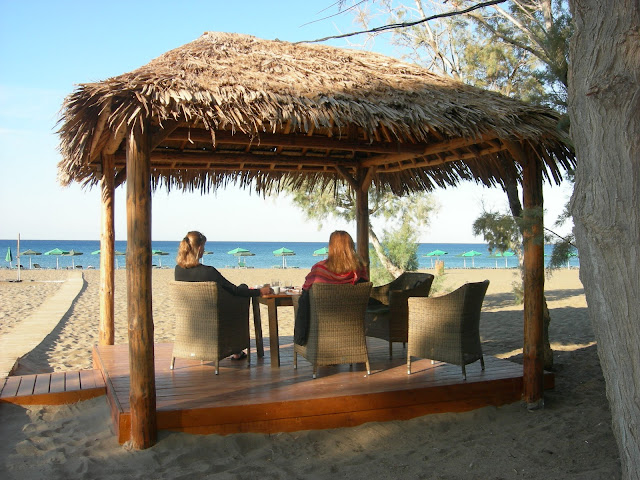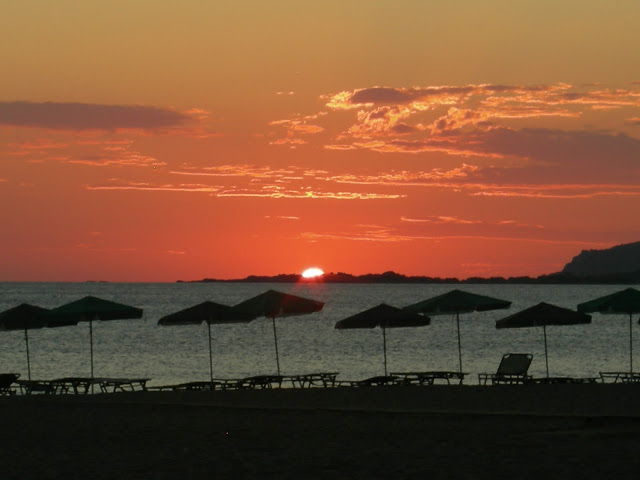
Even though this is technically our second autumn here, we are seeing it through the new eyes of "normalcy". Last year we had just arrived on the island (September 18th to be exact) and were still adjusting to our new home. Everything was so wildly different; exciting and bewildering at the same time. Now we are able to relax and take it all in as part of our lives here. As I write this, the grapes are fermenting in their casks, the chestnuts are gathered and now the countryside is humming with the sound of olive harvester rods.


The process of gathering olives is tremendously hard work that involves everyone in the family as well as many immigrants from Bulgaria and northern parts. The olive trees are dripping with the "fruit of the gods" and there is something about these olives that bring out a a sense of Cretan national pride. After all, the best olive oil in the world is claimed to come from Crete and certainly the Cretans have had plenty of centuries to perfect the industry. Even the ancient Minoans (2000 BC) appreciated the olive for its divine properties.
And that is perhaps the most interesting and sometimes astounding revelation we've experienced here in this past year - the generous mix of history, myth and religion all blended into centuries of superstition, devotion and traditions that make Crete, uniquely Crete. It is truly "the quintessential land of such fusions." (Barry Unsworth, Crete) Nowhere is this phenomenon more evident than in the little villages tucked into the hills and hanging off the mountain slopes of inland Crete. When passing through these villages preferably by foot or bike, it's often surprising to my foreign eyes, to see the startling blend of neglect and nurture. The animals are skinny and mangy-looking, the roads are wrought with potholes, the houses are crumbling and the infrastrucure is make-shift but the patios are freshly washed, the laundry is done, the vegetable gardens and orchards are carefully tended and the chapels are pristine.
 Barry Unsworth describes in his travel chronicle, Crete, a typical sight. "These village churches have an air of complete and utter tranquility. They are swept and clean, the beveled red roof tiles are repaired or replaced, the walls are white-washed, there are well-tended gardens all around. Often enough you see no one, but the care of some hand is everywhere evident, a blend of the devotional and the domestic, cats and fig trees and icons all mixed in together. Never a formal garden, no sense of elaboration, no concept of dignifying the space around, but a gardener's care for plants for their own sake, and for what they might yield, the lemon, the fig, and the almond growing among trees planted only for their flowers or the beauty of their shape." In other words, the only things under constant repair and close management seem to be the kitchens and the chapels, each a testimony to the importance of family and church in this culture.
Barry Unsworth describes in his travel chronicle, Crete, a typical sight. "These village churches have an air of complete and utter tranquility. They are swept and clean, the beveled red roof tiles are repaired or replaced, the walls are white-washed, there are well-tended gardens all around. Often enough you see no one, but the care of some hand is everywhere evident, a blend of the devotional and the domestic, cats and fig trees and icons all mixed in together. Never a formal garden, no sense of elaboration, no concept of dignifying the space around, but a gardener's care for plants for their own sake, and for what they might yield, the lemon, the fig, and the almond growing among trees planted only for their flowers or the beauty of their shape." In other words, the only things under constant repair and close management seem to be the kitchens and the chapels, each a testimony to the importance of family and church in this culture. We are often asked the question, "How has living in Crete changed you?" Patience, tolerance and wonderful friendships are all gifts we've been given. But to put it in a nutshell, we'd have to respond that we've learned to depend on God more and on things less. We all live in a world of constant, and sometimes frantic, change and Crete adds the element of unpredictability so it can be exasperating at times. We survive those days by remembering two words - BREATHE and PRAY! And then reframe and look at things differently. We've learned to not look too closly at the surroundings. It's a much prettier sight when your gaze is focused on larger vistas rather than the trash beneath your feet.
 |
| Afternoon sun on cliffs of Stavros |
 |
| Chestnuts |
 |
| Falasarna Beach in November |
 |
| Wild thyme in bloom |
























